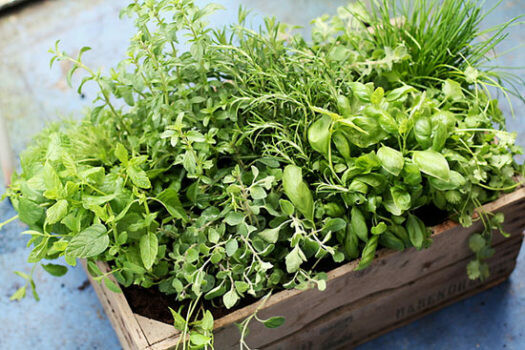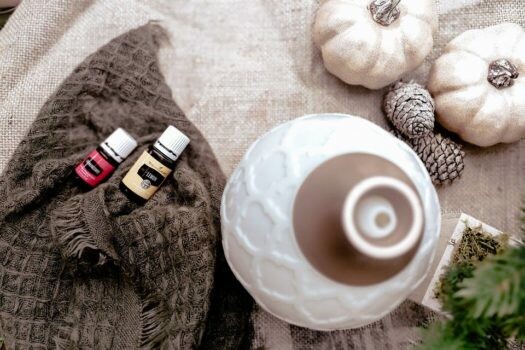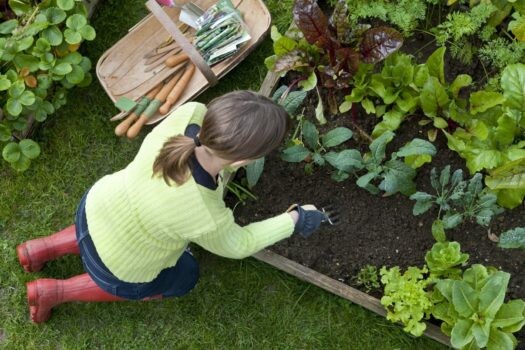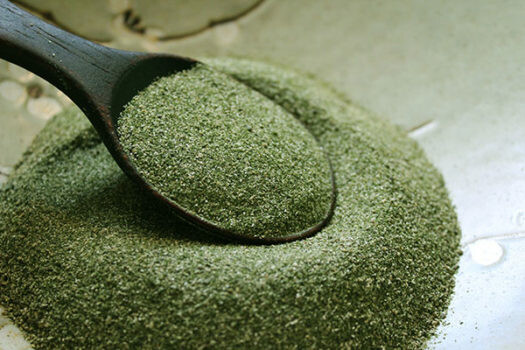
Growing, harvesting and using fresh herbs and spices can take a simple recipe from good to great by enhancing the flavor of the meat or vegetable. They are wonderful additions to soups, and can add flavor to all kinds of dishes.
We have a small herb garden growing just outside our back door, and one of the things that my husband and I really enjoy is going out and cutting them fresh to add to our meals. I love having fresh ingredients on hand all the time!
In addition to spicing up the flavor of your meal, fresh herbs offer a wide range of health benefits. They contain unique antioxidants, essential oils, vitamins, minerals, phytosterols and many other plant-derived nutrients, which help equip our body to fight against germs, toxins and to boost immunity level. Herbs are, in fact, medicines in smaller dosages. Dr. Lawrence Wilson says “not only do they add flavor, but they may add vitamins in large amounts.”
Health Benefits Of Herbs
Some herbs have more vitamins and nutrients than others. Among the best are parsley, rosemary, basil, cilantro (coriander), thyme, and oregano. All these herbs are full of nutrients and contain compounds that support the immune system, contain antioxidants that also help heal and aid immunity, and are a good source of specific vitamins and minerals:
- Basil – It’s rounded, pointy leaves look similar to the peppermint plant to which it is related and contains manganese, copper, calcium, iron, magnesium, and Vitamins A, C, and K. Basil’s flavonoids and oils provide antibacterial and anti-inflammatory benefits.
- Cilantro/Coriander – Fresh coriander leaves are more commonly known as cilantro. When the plant blooms, the seeds produced are what is dried and ground to become the spice we call coriander. Coriander/cilantro contains Vitamins A, C, and K and is highly anti-bacterial. In parts of Europe, coriander has traditionally been referred to as an “anti-diabetic” plant. In parts of India, it has traditionally been used for its anti-inflammatory properties. In the United States, coriander has recently been studied for its cholesterol-lowering effects and is useful for removing toxic heavy metals from the system.
- Rosemary – The pine-like aroma and strong flavor make this a popular herb to use with chicken and lamb dishes. Rosemary contains substances that are useful for stimulating the immune system, increasing circulation, and improving digestion. It is also believed to strengthen the memory; in ancient Greece, students would place rosemary sprigs in their hair when studying for exams.
- Thyme – This herb contains Vitamin C, iron, and manganese. It has a long history of use in natural medicine in connection with chest and respiratory problems including coughs, bronchitis, and chest congestion. The flavonoids and volatile oil components found in thyme make this herb antimicrobial and high in antioxidants.
- Parsley – While parsley is a wonderfully nutritious and healing food, it is often under-appreciated. Most people do not realize that this vegetable has more uses than just being a decorative garnish that accompanies restaurant meals. This popular herb contains Vitamins A, B1, B3, C and K, as well as iron, folate, copper, magnesium, potassium, phosphorous, calcium, and zinc. Parsley can neutralize certain types of carcinogens, boost the immune system, protect the heart, treat degenerative arthritis and assist in removing toxic heavy metals from the body. Its complex variety of vitamins and minerals make it an excellent addition to your diet.
- Oregano – Oregano is called wild marjoram in many parts of Europe since it is closely related to the herb that we know as sweet marjoram. It contains Vitamin K, manganese, iron, calcium and fiber. Oregano is highly antibacterial, high in antioxidants and a good source of fiber. The essential oils contained in oregano are powerful bacteria inhibitors making this herb good for dealing with respiratory infections and so much more.
- Tarragon – Tarragon is a excellent source of minerals like calcium, manganese, iron, magnesium, copper, potassium, and zinc as well as Vitamins A, B1, B2, B6 and C. It has traditionally been used to stimulate the appetite, improve digestion, support cardiovascular health and may also help lower blood sugar levels.
Growing Your Own Herbs
Fresh herbs are easy to find at farmer’s markets, natural food stores, and some supermarkets, but I want to encourage you to grow your own this year. When you grow your own herbs, you can simply clip what you need fresh from the plants; and since you grew them you can be assured that they are pesticide-free. It is said that you get more nutritional value if you harvest them right before use.
“Half of the nutritional value of plants is lost within thirty minutes of harvesting,” says Brian Hetrich, a naturopathic doctor and gardening expert at the Hippocrates Health Institute. Herbs can be grown in small pots in the windowsill, container gardens in the yard or larger garden beds, so no matter how much space you have, you can still grow herbs. The results are only limited to the types of herbs you decide to plant and how daring you want to be with your menu!
I grow plants for many reasons: to please my eye or to please my soul, to challenge my patience, for novelty or for nostalgia, but mostly for the joy in seeing them grow. – David Hobson
Growing your own herbs also provides you with the opportunity to be outside in the sunshine and enjoying the fresh air. I encourage you to get out there and start planning your own beautiful and aromatic herb garden. It really is fun, and the benefits can’t be beaten.
Additional Resources
- From Garden to Table: Harvesting Herbs for Healthy Eating
- The Herb Growing Cheat Sheet
- Healthy Herbs Nutrition Facts
- The World’s Healthiest Foods
Disclaimer: The information contained herein is not to be construed as medical advice and is not intended to diagnose, treat, or cure any medical condition. These statements made have not been approved by the FDA, nor should they be taken as a substitute for medical advice from a licensed physician.
Affiliate Links: Some links on my website and emails are affiliate links. Should you click on these links and decide to purchase anything, I will receive a small commission and you will have my sincere thanks for supporting Tina’s Healthy Living.












